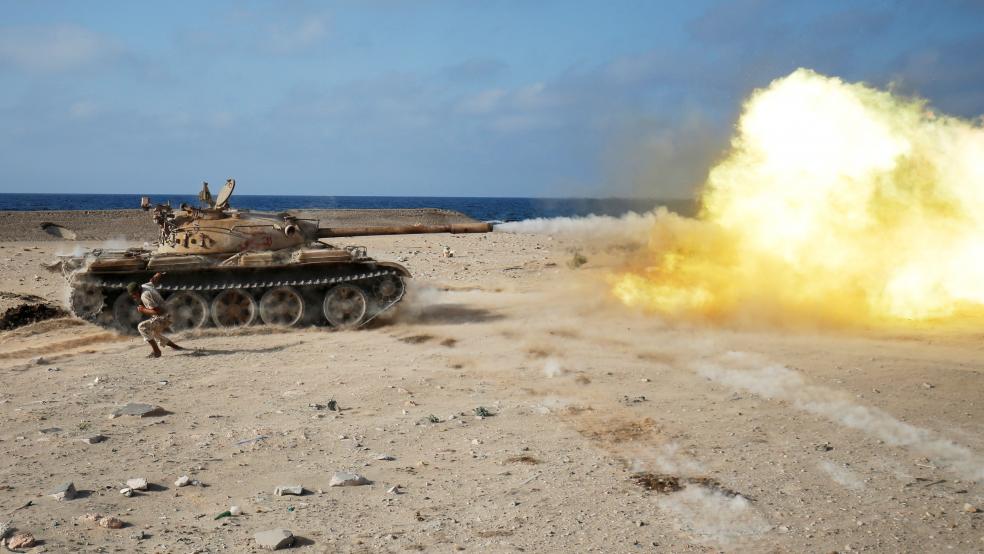Even though some of his political opponents have been demanding a greater use of force against ISIS in the Middle East, President Obama has refused to base his military strategy on a “political talking point.” Whether domestic or foreign officials have prompted the commander in chief to shift tactics in his fight against the Islamic State in Libya, his decision to provide air support to Libyan ground forces is a strategic pivot in America’s war against radical Islamist terrorism.
“The good news is that we now have the beginnings of a government in the Government of National Accord,” Obama said during a press conference on Tuesday. “They are serious about trying to bring all the factions together to start creating a basic security structure, to begin to monitor Libya’s borders, and to cooperate internationally to deal with issues like ISIL penetration on their territory.”
Related: America’s High-Tech F-35 Is Poised to Purge ISIS from 30,000 Feet
Supporting the Libyan GNA, the U.S. military conducted "precision air strikes against ISIL targets in Sirte, Libya," the U.S. Department of Defense said in a statement on Monday. The president authorized these airstrikes following a recommendation from Secretary of Defense Ash Carter and Chairman of the Joint Chiefs of Staff Joseph Dunford. This is the third time in eight months the United States has attacked ISIS in Libya, but this is the first time the Obama administration has agreed to provide air support to the Libyan government’s ground troops “at the request of that government.”
“It is in America’s national security interests in our fight against ISIL to make sure that they’re able to finish the job,” he said.
An anonymous review of the Obama administration’s war against ISIS in the Wall Street Journal, praised the president for finally assisting the Libyan government in preventing the expansion of the Islamic State.
“The Libyan effort is crucial to the larger anti-ISIS campaign, especially as pressure grows on the terror group’s strongholds in Iraq and Syria,” the op-ed outlined. “If the jihadists are forced to flee Mosul or Raqqa, they would love to be able to raise their black flag over cities in Libya. Islamic State’s appeal depends on its ability to hold territory to pretend it’s a state. It also needs areas where it can train recruits without fear of U.S. air strikes.”
Still, Obama’s move could be premature, given the ongoing rivalries between the new GNA and the Libyan National Army, which is loyal to the government in eastern Libya. Jason Pack of Eye on ISIS in Libya told The Economist that there is no “unity government, just a rebranding of Misratan militias.” He said you can’t count on their loyalty.
Including the president, there have been some who believe a ground war against ISIS is exactly what the terror group wants. Iraqi Prime Minister Haider al-Abadi in December 2015 requested additional airstrikes, weapons and intelligence from the United States, but stressed his country didn’t “want combat troops on the ground to carry [out] military missions on the ground.”
Related: After the Victory at Fallujah, How to Destroy ISIS Once and for All
Some have disagreed with this defense tactic. Russian President, Valdimir Putin, said in December 2015 that he’d be sending in ground troops into Syria to “wipe out evil Islamic State.” Others have questioned Obama's no-ground-troops policy, claiming the president’s argument, which has been in opposition to the Bush administration’s nation-building strategy, is fundamentally flawed.
“Critics of the Obama administration insist that ISIS is growing stronger because Washington has not been aggressive enough in attacking the terrorists in Syria and Iraq,” said Tom Mockaitis, counter-terrorism expert at DePaul University, in a blog post. “They point to the wave of attacks in Europe, the San Bernardino shootings, and the Orlando night club massacre as compelling evidence that more strident military measures must be employed against this pernicious organization.”
But eliminating “ISIS requires a comprehensive, long haul strategy that combats the threat at all levels,” he said, indicating the importance of a carefully employed military force. While he didn’t comment on Libya specifically, he did acknowledge that sending ground forces into Syria would be a mistake.
“Focused airstrikes, direct action by Special Forces and assistance to regional allies is producing results, and with fewer adverse effects than would an increased U.S. presence in the Middle East,” Mockaitis noted. “Countering radicalization and degrading the ISIS network is just as important as attacking the parent organization and requires painstaking efforts by law enforcement and intelligence agencies around the world.”




